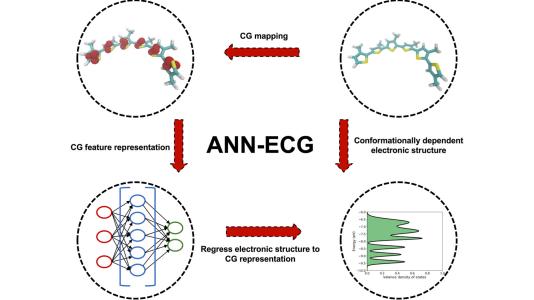
Scientific Achievement
Artificial Neural Network-Electronic Coarse Graining (ANN-ECG), a hybrid machine learning protocol, enables efficient and accurate mapping of atomistic electronic structure onto coarse-grained representations of soft matter simulations.
Significance and Impact
ANN-ECG accelerates optoelectronic characterization in soft semiconductors by ~4 orders of magnitude, and provides physical insight for defining coarse-grained representations.
Research Details
- The conformation-dependent electronic structure of polythiophene is predicted directly at the coarse-grained resolution with unprecedented accuracy using machine learning. Such calculations are not feasible at the purely atomistic level.
- Accurate machine learning models can be trained with minimal data (1,000’s of configurations).
- ANN-ECG can be straightforwardly extended to treat condensed phases and polymeric materials.
Work was performed at Argonne National Laboratory.
DOI: https://doi.org/10.1126/sciadv.aav1190
Argonne National Laboratory seeks solutions to pressing national problems in science and technology. The nation’s first national laboratory, Argonne conducts leading-edge basic and applied scientific research in virtually every scientific discipline. Argonne researchers work closely with researchers from hundreds of companies, universities, and federal, state and municipal agencies to help them solve their specific problems, advance America’s scientific leadership and prepare the nation for a better future. With employees from more than 60 nations, Argonne is managed by UChicago Argonne, LLC for the U.S. Department of Energy’s Office of Science.
The U.S. Department of Energy’s Office of Science is the single largest supporter of basic research in the physical sciences in the United States and is working to address some of the most pressing challenges of our time. For more information, visit https://energy.gov/science.